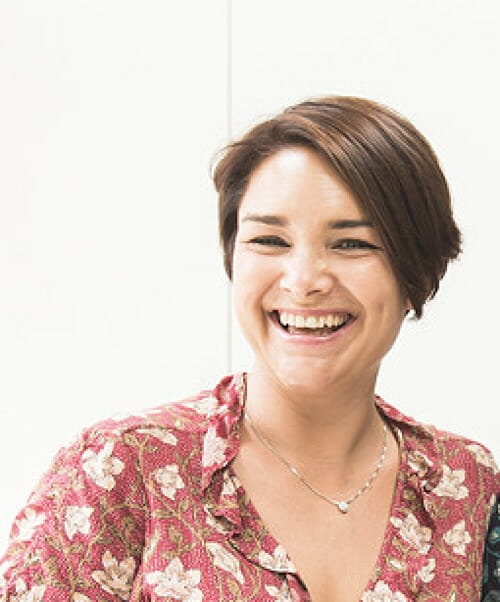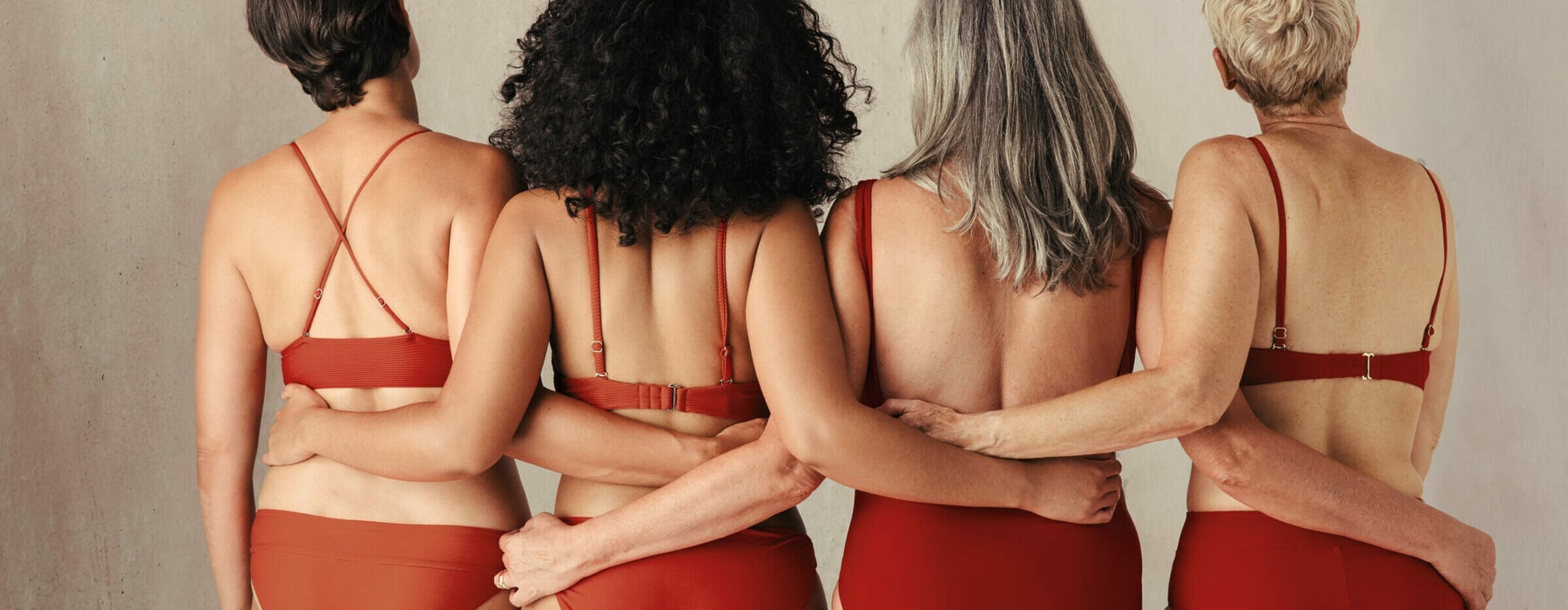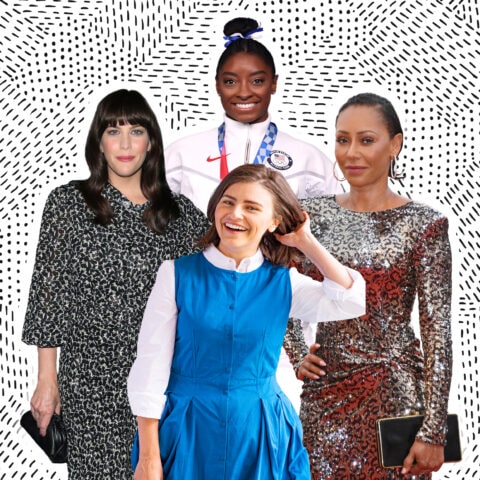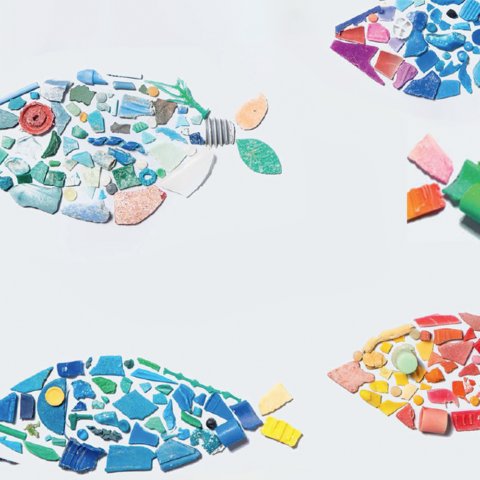What’s your relationship like with your body? It’s not something you might have thought about before. But think about it now. Many of us talk to ourselves, and others, about our bodies negatively. We might talk about our own bodies in ways that are harsh, judgmental, dismissive – ways we’d never dream of speaking about or to anyone else.
This is common for women. We’re subjected to many toxic inputs, especially now in the age of social media. We are bombarded with doctored and distorted images of the female body and face multiple times every single day. Those bodies might be more diverse in terms of size and shape and ethnicity than what we have seen in the past – when thin and white reigned supreme – which is great. But today’s bodies are just as unrealistic.
Layer on the ageing piece of the puzzle, and the picture shifts again. While we can now see fabulous young women in larger bodies being great role models, and we can see fabulous older women looking amazing in smaller bodies, it’s rare to see aspirational content anywhere that’s at that intersection of age and size. As one friend brutally put it to me: “you can be fat or you can be old but you can’t be old AND fat.”
Rachael Wilson is a dietitian who specialises in disordered eating, body acceptance and intuitive eating. She reckons pressure on women to look a certain way can be overwhelming, and it can lead to real issues with body image, in turn leading to other health challenges. Body acceptance is a cornerstone of true wellness, and many of us struggle with it.
“Women aren’t allowed to grow old”, she says, “let alone in a larger body.”
The potent influences of our youth still linger, she thinks.
“When I grew up there was the heroin chic of the nineties, and ‘nothing tastes as good as skinny feels’ and Kate Moss… and then you had Weight Watchers and Atkins.”
In a story familiar to many, Wilson went on her first diet at 13. “I didn’t need to go on a diet, but my mum hated her body, and she wanted a bit of company doing Weight Watchers.”

These pivotal times in life are moments of vulnerability for a fragile body image.
“It’s those changes in life that leave us open to disordered eating creeping in”, Wilson explains. “We gain weight in puberty. It’s a natural part of development; we talk about the teenage puppy fat kind of thing, but it happens naturally.
“And it’s the same with menopause. It’s a natural part of development to gain weight during menopause. But we have all this programming saying we shouldn’t.”
Wilson reckons young women now have it even worse, with social media and altered images the norm.
“They’ve got even more layers of stuff. They’re not seeing normal images, and everything’s filtered and edited. The amount of people using fillers and Botox is shocking. And social media is that tool of comparison that we didn’t have.”
As we move into midlife and beyond, and our bodies naturally change, it can be confronting. And it can lead to women treating their bodies harshly, ranging from negative self-talk all the way through punishing diets and into disordered eating. There’s a second spike in diagnosed eating disorders among women in their 50s and 60s, and experts think there’s a lot of what they call ‘sub-threshold’ disordered eating going on, too.
Punishing ourselves is the exact opposite of what we should be doing, Wilson and other body acceptance experts say. Now’s the time to start caring for and loving our bodies; or if not wholeheartedly loving them, accepting them as they are right now.
“It’s really hard to care for our bodies if we hate them”, Wilson notes.
“When we’re coming from a place of restriction and restraint, it negatively affects our mental health and it disconnects us from our body.”
So: what are some ways we can practice body acceptance? Wilson has a few tips to get us started.
Recognise The Negative Inputs And Detox Your Feeds
Social media is a good place to start.
“In order to start liking ourselves and feeling comfortable in our bodies, we need to know where the negative programming is coming from, so that we can start changing it”, advises Wilson.
That means looking at your feed. “What and who are you following? Are you following all this stuff that’s telling you to lose weight or telling you to look a certain way or be a certain size?”.
If we see that we are, she says, we can start to look at the content with a more critical eye. And we can start to detox our feed.
We mustn’t forget about the influence of capitalism here, either.
“There are billion-dollar industries designed to make us feel like crap so we’ll buy more stuff”, Wilson points out.
The take-out: If a person or account is making you feel bad about yourself (especially while also trying to sell you something): unfollow.
Appreciate The ‘Now’ Body
Just as it’s unlikely we’ll ever have the body we had at 30, it’s equally pointless waiting for a future body we might never achieve before we start to like and look after ourselves.
Wilson explains: “We’re not talking about your yesterday body. It’s not your tomorrow body. It’s the body that’s showing up today. It’s your now body. And one of the things I like to say to people is: what do you need right now? Tune into that: what are the ways that you can be kind to yourself in this moment?”
The take out: your body deserves acceptance and kindness now. Today – not at some future point when you’ve achieved a goal of changing it.
Practice Self-Compassion
Treating ourselves with kindness can be hugely powerful.
“You’re the only person who’s going to be with you your whole life”, Wilson points out. “So you can choose what you want that eternal internal voice to be. You can choose a voice of hatred. Or you can choose to be your friend to yourself.”
She reiterates that stopping and asking ourselves in moments of self-criticism: how would I talk to a friend? – is a great habit to practice.
“I think an element of mindfulness comes into it as well, because when we are aware of how we are thinking, we can start to pick up on when we’re being negative towards ourselves.”
Alongside this is recognizing our bodies as only one part of us, and appreciating the body for what it can do, rather than just how it looks. True self-compassion means a shift from punishing the body – dieting or exercising to change the shape and size of it, for example – to caring for the body by doing things that make it feel and function better.
“Our body is the vessel that gets us from A to B”, Wilson say. “and it’s really important that we take care of it. Do movement that helps our joints, and helps our mental health and keeps our backs well. And do it to take care of our body, not to make it look different.”
The take out: Tune in to your body; what it needs and how you might best care for it. Think of any wellness practice (and of food) this way, rather than as a punishment or a reward.
Accepting our bodies takes time and practice; as Wilson points out, it’s a journey. A lifetime of negative thinking doesn’t disappear with a few affirmations. But we can change over time. Wilson sums it up:
“By tuning into our bodies and feeling how our body feels, we can feel what feels right for us: what movement feels good? What food feels good? What feels nourishing? Because when you can connect with that, then I think you’re being both physically and mentally healthy.”
Related Article: Everi-Body: The change the Fashion Industry Needed








